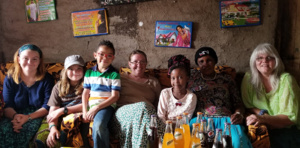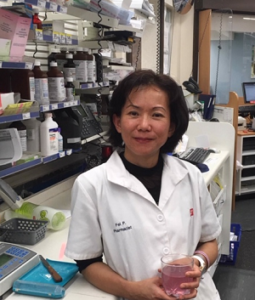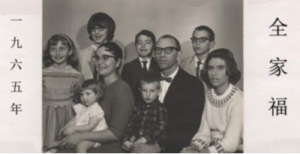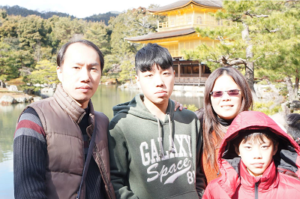 Alethea Short is a Taiwan born American. She has taught third, fourth, and fifth graders in Detroit and Nashville. She took a trip to Tanzania, Africa, in June. We interviewed her about the trip highlight—telling a personal story to one Maasai man. One day her sister-in-law, a nurse, took her to visit a sixteen years old teen who is a Maasai. His father killed a goat to host them because his son was hit by a buffalo three months ago and was saved by her sister-in-law and Alethea’s parents who personally flew to Africa with the medical supplies necessary to save the young man’s life. After dinner, the sister-in-law asked if Alethea could tell her story to the father, and she did. Alethea has a gift from her missionary brother, a Maasai cloak, and she took it to school in Detroit. Many students were from dysfunctional homes and grew up without father and mother. Six boys often arrived at school angry. They flipped their desks, when irritated. Most teachers didn’t know what to do. But, Alethea asked the boy to sit in her teacher’s chair, wrapped the Maasai cloak around his body and told him, that Maasai cloak is wore by the Maasai warrior. Many African American’s ancestors were Maasai warriors. Now, with the cloak wrapped around him, the boy felt connected to and protected by a powerful member of his African family, though in reality he was neglected. The story is touching and double edged. The father appreciated Alethea’s story, because Maasai people are looked down upon by African neighbors today. He was surprised that an American would value his culture and use their cloak to help African descendants in America. When they exited his house, there was no light, but the stars. Alethea watched the milky way right in front of her. Her trip witnessed many wonderful works of the hands of Almighty God for the good of people.
Alethea Short is a Taiwan born American. She has taught third, fourth, and fifth graders in Detroit and Nashville. She took a trip to Tanzania, Africa, in June. We interviewed her about the trip highlight—telling a personal story to one Maasai man. One day her sister-in-law, a nurse, took her to visit a sixteen years old teen who is a Maasai. His father killed a goat to host them because his son was hit by a buffalo three months ago and was saved by her sister-in-law and Alethea’s parents who personally flew to Africa with the medical supplies necessary to save the young man’s life. After dinner, the sister-in-law asked if Alethea could tell her story to the father, and she did. Alethea has a gift from her missionary brother, a Maasai cloak, and she took it to school in Detroit. Many students were from dysfunctional homes and grew up without father and mother. Six boys often arrived at school angry. They flipped their desks, when irritated. Most teachers didn’t know what to do. But, Alethea asked the boy to sit in her teacher’s chair, wrapped the Maasai cloak around his body and told him, that Maasai cloak is wore by the Maasai warrior. Many African American’s ancestors were Maasai warriors. Now, with the cloak wrapped around him, the boy felt connected to and protected by a powerful member of his African family, though in reality he was neglected. The story is touching and double edged. The father appreciated Alethea’s story, because Maasai people are looked down upon by African neighbors today. He was surprised that an American would value his culture and use their cloak to help African descendants in America. When they exited his house, there was no light, but the stars. Alethea watched the milky way right in front of her. Her trip witnessed many wonderful works of the hands of Almighty God for the good of people.
 Drug addiction is not just a criminal problem, but a social issue nowadays. Why do people hesitate to take prescribed pain medicine after surgery for fear of getting addicted? Dr. Bai Fei Ying, Ph.D. in pharmacy, replied to Salina in an interview in July, that as long as you follow doctors’ instructions and take it within half a year, you shouldn’t be worried about becoming addicted. Patients and their loved one like to know in what situations the pain medication could become addictive. Dr.Bai pointed to three things that patients should avoid at all cost: 1) taking pain medications from different doctors at the same time, 2) taking other pain medicine together with the one prescribed by the doctor, 3) taking pain medicine with alcohol. Any patient who does one or more of the three things runs a risk of becoming addicted. Dr. Bai advised that patients shouldn’t totally rely on medicine to remove the pain. An examination of his or her whole health condition and life style may help more to solve the issue.
Drug addiction is not just a criminal problem, but a social issue nowadays. Why do people hesitate to take prescribed pain medicine after surgery for fear of getting addicted? Dr. Bai Fei Ying, Ph.D. in pharmacy, replied to Salina in an interview in July, that as long as you follow doctors’ instructions and take it within half a year, you shouldn’t be worried about becoming addicted. Patients and their loved one like to know in what situations the pain medication could become addictive. Dr.Bai pointed to three things that patients should avoid at all cost: 1) taking pain medications from different doctors at the same time, 2) taking other pain medicine together with the one prescribed by the doctor, 3) taking pain medicine with alcohol. Any patient who does one or more of the three things runs a risk of becoming addicted. Dr. Bai advised that patients shouldn’t totally rely on medicine to remove the pain. An examination of his or her whole health condition and life style may help more to solve the issue.
In a follow-up interview, Dr. Bai surprised Salina with this statement, that the root of addictions, whether one is addicted to drug, alcohol, porn, cigarettes, food, cell phones, shopping, gambling, etc., is the same. What is the root of all addictions? Dopamine is the culprit of how and why people become addicted. Dr. Bai explained that dopamine is produced by our brain and gives us a sense of happiness which drives us to want to get more. The more exciting the activity is, the more dopamine our brain produces. So if shopping or gambling, watching TV or playing video games, drinking alcohol or watching porn, make us excited, our brain produce more dopamine than our body normally does. As desire gets too strong to control, addiction follows. What is the solution when one gets addicted? Dr. Bai led us to learn about our limbic system and the prefrontal cortex in our brain which are the keys to the solution to addiction. Our limbic system tells us to get instant gratification. The prefrontal cortex helps us to reason and control ourselves. The former is born stronger than the latter. But, if we actively train our prefrontal cortex by making the right choice and acting on self-control, we overcome the dominant charge of our limbic system for instant gratification. Training our brain and mind is the way to resist temptation and avoid addiction.
 Missionaries are hidden heroes in society. Few people knew the impact they made until one day people served by a missionary spoke up. Mr. and Mrs. Guo from Taiwan accepted our telephone interview to talk about missionary they met thirty years ago. Mrs. Guo, then Ms. Yuan, was an assistant at an orphanage home in Taipei. One day an American missionary couple, Enoch and Jeanine Thweatt, came to visit the orphans. The Thweatts visited frequently, stayed long, spent time with children, teaching, singing, playing, praying. Children actually learned useful things such as English and the Bible. A few of them later went to America through Enoch’s assistance, finished their undergraduate and graduate studies in Christian colleges. A few became engineers, school principals, and church leaders because of the Thweatts. Enoch helped tirelessly to see the remodeling of the orphanage finished. Both the orphans and the building were no longer the same due to their efforts. After Mr. Guo and Ms. Yuan got married, Mr. Guo started to attend church and studied the Bible. What inspired him to want to become a Christian was the mutual love between Enoch and Jeanine. He said I want to be like them, and asked to be baptized. Mrs. Guo learned to submit to her husband from Jeannine. From there they learned to walk with God as a Christian couple. How beautiful are the feet of those who bring good news of good things!
Missionaries are hidden heroes in society. Few people knew the impact they made until one day people served by a missionary spoke up. Mr. and Mrs. Guo from Taiwan accepted our telephone interview to talk about missionary they met thirty years ago. Mrs. Guo, then Ms. Yuan, was an assistant at an orphanage home in Taipei. One day an American missionary couple, Enoch and Jeanine Thweatt, came to visit the orphans. The Thweatts visited frequently, stayed long, spent time with children, teaching, singing, playing, praying. Children actually learned useful things such as English and the Bible. A few of them later went to America through Enoch’s assistance, finished their undergraduate and graduate studies in Christian colleges. A few became engineers, school principals, and church leaders because of the Thweatts. Enoch helped tirelessly to see the remodeling of the orphanage finished. Both the orphans and the building were no longer the same due to their efforts. After Mr. Guo and Ms. Yuan got married, Mr. Guo started to attend church and studied the Bible. What inspired him to want to become a Christian was the mutual love between Enoch and Jeanine. He said I want to be like them, and asked to be baptized. Mrs. Guo learned to submit to her husband from Jeannine. From there they learned to walk with God as a Christian couple. How beautiful are the feet of those who bring good news of good things!
 The former Senior Producer of our Chinese department, Edward Short (Xie De Hua), came to our studio in July with his wife, Sharon Short, to do an interview about serving a group of Third Culture Kids whose parents chose to do missionary work in Africa. Being missionary mom, Sharon knows missionary kids are lonely because they were born and grew up in a country that is not their parents’ native land. Edward said to be a third culture kid is hard. They are not Americans, but they are not Africans as well. In school they were exposed to the local culture. After school they came home to an American culture. Third culture kids acquired a little bit of both cultures and they felt different and awkward, yet their friends are not aware of their struggles. But, Edward pointed out, there are advantages too to being third culture kids. They speak another language and travel to foreign countries. Above all, they have a special belonging to Jesus Christ who was also a third culture kid because Jesus came to earth from heaven, and learned things from both heaven and this world. Edward and Sharon helped thirty children with the concept of Third Culture Kids while their parents attended a retreat for missionaries to Africa. Sharon observed in these missionary children before and after the program, a sense of relief and joy after they realized for the first time who they are and why they are different. Confusion and loneliness subsided, and a new awareness developed of belonging to other missionary children. Many of these children cried when the activity was over. They didn’t want to leave. They feel they belong to each other. Edward and Sharon stay in contact with them through social media. Edward just retired, but he and his wife continue serving missionaries because they know the lives, the challenges, the needs, and importance of missionary.
The former Senior Producer of our Chinese department, Edward Short (Xie De Hua), came to our studio in July with his wife, Sharon Short, to do an interview about serving a group of Third Culture Kids whose parents chose to do missionary work in Africa. Being missionary mom, Sharon knows missionary kids are lonely because they were born and grew up in a country that is not their parents’ native land. Edward said to be a third culture kid is hard. They are not Americans, but they are not Africans as well. In school they were exposed to the local culture. After school they came home to an American culture. Third culture kids acquired a little bit of both cultures and they felt different and awkward, yet their friends are not aware of their struggles. But, Edward pointed out, there are advantages too to being third culture kids. They speak another language and travel to foreign countries. Above all, they have a special belonging to Jesus Christ who was also a third culture kid because Jesus came to earth from heaven, and learned things from both heaven and this world. Edward and Sharon helped thirty children with the concept of Third Culture Kids while their parents attended a retreat for missionaries to Africa. Sharon observed in these missionary children before and after the program, a sense of relief and joy after they realized for the first time who they are and why they are different. Confusion and loneliness subsided, and a new awareness developed of belonging to other missionary children. Many of these children cried when the activity was over. They didn’t want to leave. They feel they belong to each other. Edward and Sharon stay in contact with them through social media. Edward just retired, but he and his wife continue serving missionaries because they know the lives, the challenges, the needs, and importance of missionary.
 Taiwan is a society packed with materialism and Buddhism. Therefore, if a tenth grade high school student preached at a church in Taipei, it causes people to wonder “what happened”? We interviewed the young man, Wu Cheng Han, by telephone, and chatted about the people and elements of influence that have molded him. Cheng Han hesitated not to name his parents as most influential in his life. He remembers his mom telling Bible stories daily. She often related the Bible story to what happened in Taiwan to help him understand the significance of God’s word. As he grew older Cheng Han’s parents took him to church every week and allowed God’s word to mold his character and to shape his worldview. He saw Adam and Jesus as the two most influential men in history whose lives affected everyone on earth. Adam was the first man who introduced sin to the world. Since then, everyone sinned, including him. Fortunately, God sent his son Jesus to the world, and now salvation from sin is available to all mankind. Cheng Han was baptized a year ago. He extends the love of God and the church to his brother, and he likes to do the same to his friends at school. He hopes to study the law in England in order to help international refugees in the future. Compassion and world vision thrive in this young man due to the church of Christ in Taiwan. In a country full of idol worship, Cheng Han is a witness to the new life in Jesus and to the truth—“I am not ashamed of the gospel, for it is the power of God for salvation to everyone who believes.”
Taiwan is a society packed with materialism and Buddhism. Therefore, if a tenth grade high school student preached at a church in Taipei, it causes people to wonder “what happened”? We interviewed the young man, Wu Cheng Han, by telephone, and chatted about the people and elements of influence that have molded him. Cheng Han hesitated not to name his parents as most influential in his life. He remembers his mom telling Bible stories daily. She often related the Bible story to what happened in Taiwan to help him understand the significance of God’s word. As he grew older Cheng Han’s parents took him to church every week and allowed God’s word to mold his character and to shape his worldview. He saw Adam and Jesus as the two most influential men in history whose lives affected everyone on earth. Adam was the first man who introduced sin to the world. Since then, everyone sinned, including him. Fortunately, God sent his son Jesus to the world, and now salvation from sin is available to all mankind. Cheng Han was baptized a year ago. He extends the love of God and the church to his brother, and he likes to do the same to his friends at school. He hopes to study the law in England in order to help international refugees in the future. Compassion and world vision thrive in this young man due to the church of Christ in Taiwan. In a country full of idol worship, Cheng Han is a witness to the new life in Jesus and to the truth—“I am not ashamed of the gospel, for it is the power of God for salvation to everyone who believes.”

